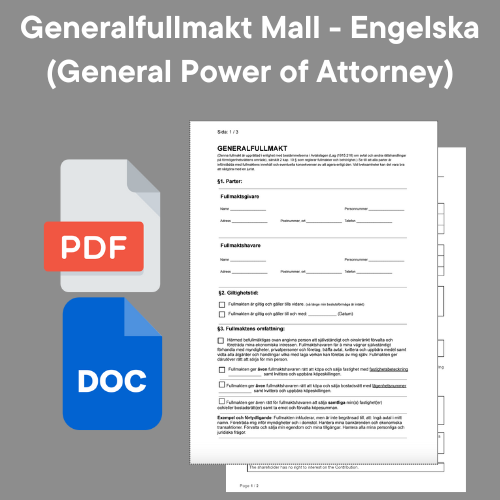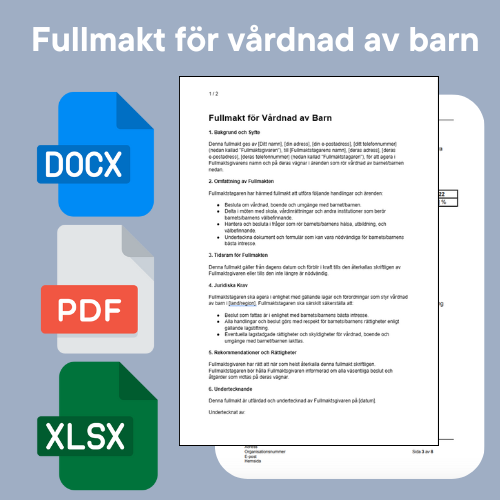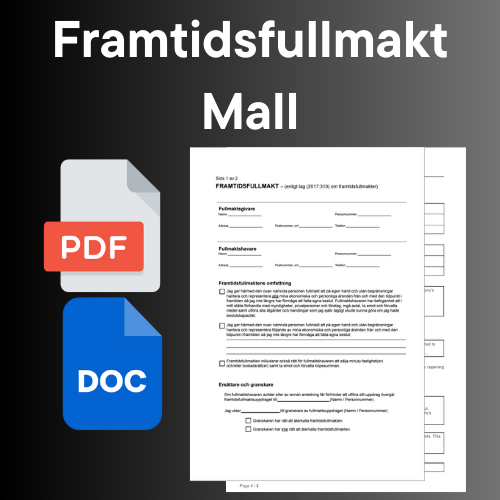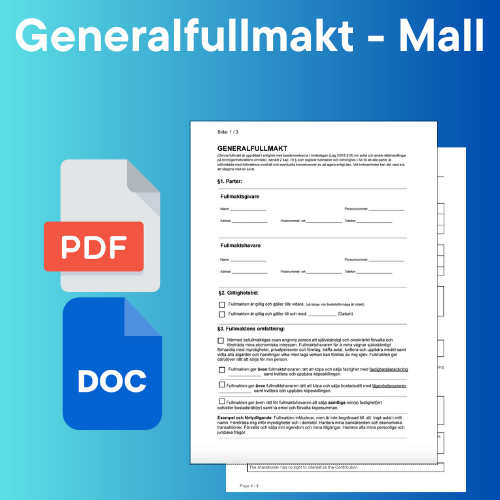Power of Attorney Act
Share
Power of Attorney: A Comprehensive Guide to Law and Practical Application
Discover everything you need to know about powers of attorney, from laws to practical advice and common mistakes to avoid.
Introduction
A future power of attorney is a legal document that gives a person (the power of attorney) the opportunity to appoint someone else (the power of attorney) in advance to make decisions for them if in the future they are no longer able to do so themselves due to, for example, illness or old age. The future power of attorney is an important tool to ensure that one's affairs are managed according to one's wishes when one can no longer make his own decisions.
This article will explore the law's requirements, common mistakes, how to set up a proper Power of Attorney, and answer common questions that arise about this legal tool.
What does the law say about powers of attorney?
The Act on Future Powers of Attorney came into force on 1 July 2017 and is primarily regulated by the Future Powers of Attorney Act (2017:310). The law is designed to give individuals greater control over who will manage their personal and financial affairs if they are no longer able to do so themselves.
Basic requirements for a valid power of attorney:
- The power of attorney must be at least 18 years old and have the ability to take care of their affairs when the power of attorney is established.
- The power of attorney must be in writing and signed by the power of attorney in the presence of two witnesses who are objective and impartial. The witnesses must not be close relatives or people who have a vested interest in the power of attorney.
- The content of the power of attorney must specify who is the power of attorney and what matters the power of attorney covers. It can be anything from financial decisions to personal matters, but it must not include medical care or dental care.
Common mistakes when drawing up power of attorney
Creating a power of attorney is an important step, but there are several common mistakes that can make the power of attorney invalid or ineffective:
- Lack of attestation: If the witnesses are not impartial or if the power of attorney is not properly witnessed as required by law, the future power of attorney can be declared invalid.
- Unclear or too general instructions: A future power of attorney that is vague or does not specify in sufficient detail what it should cover can create confusion and lead to the power holder not being able to act according to the intentions of the power giver.
- Failure to update the future power of attorney: If circumstances change, for example if a previously appointed power of attorney is no longer suitable, it is important to update the power of attorney to avoid future problems.
- Ignore the possibility of involving a court: In some cases, it may be wise to include a clause requiring judicial review for the power of attorney to take effect, especially if there is a risk of litigation.
When does the power of attorney for the future come into effect?
A power of attorney for the future comes into effect when the person giving the power of attorney can no longer take care of his affairs due to illness, mental disorder or a similar condition. It is the holder of the power of attorney who decides when this time has come, but it is also possible to specify in the power of attorney that a court shall decide on the entry into force.
Real examples and legal disputes
There are several examples of how future powers of attorney can lead to disputes, especially if the power of attorney has not been sufficiently clear in its instructions or if there are several potential power of attorney holders with conflicting interests. A common scenario is when siblings cannot agree on how the parent's assets should be managed, which can lead to legal disputes that in some cases have to be settled in court.
How do you establish a power of attorney for the future?
In order to establish a valid future power of attorney, it is recommended to either consult a lawyer or use a reliable online tool to ensure that all legal requirements are met. It is important to think through who is to be appointed as power of attorney and to clearly specify what this person should be entitled to do. Keeping the original document in a safe place and informing relatives of its existence is also crucial.
Frequently asked questions about powers of attorney
1. Can I revoke or change my power of attorney for the future?
Yes, the power of attorney can change or revoke a future power of attorney at any time, provided that he is still competent to make decisions. For changes, the same form requirements apply as when the power of attorney was originally drawn up.
2. What happens if I do not have a future power of attorney?
If a future power of attorney does not exist, a court can appoint a good man or administrator to manage your affairs. However, this may mean less control over who is appointed and how your affairs are handled.
3. Does the power of attorney for the future have to be registered?
No, a power of attorney does not need to be registered. It comes into effect when the power of attorney becomes unable to manage his own affairs and the power of attorney judge that it is time to use it. However, it may be beneficial to warn the bank or other interested parties that a power of attorney for the future exists.
Summary
The power of attorney for the future is a powerful tool that gives you the opportunity to ensure that your affairs are managed according to your wishes if you can no longer make your own decisions. By carefully establishing a future power of attorney and avoiding common mistakes, you can create security for both yourself and your loved ones. It is an investment in your future security that can save you and your loved ones a lot of worry and potential disputes.




